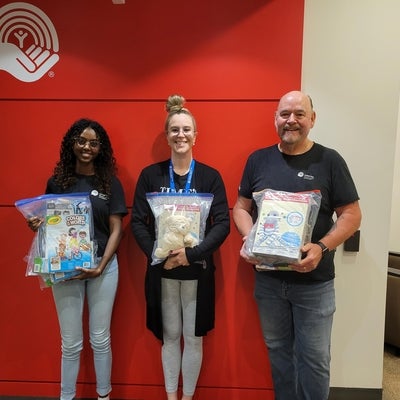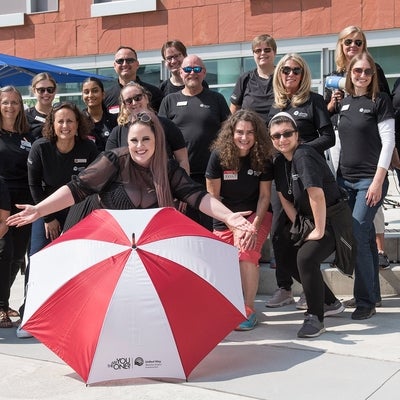Students help United Way approach solutions with a diverse lens
By: Krista Henry (she/her)
Celebrating work-integrated learning (WIL) month
United Way Waterloo Region Communities empowers students to make a difference. As the largest non-government funder of social service programs in Canada, United Way invests in community-wide solutions.
Throughout the year, students help United Way member organizations to solve challenges by offering input and fresh ideas.
In 2021, United Way Waterloo Region Communities (WRC) and the University of Waterloo partnered to create Co-op for Community.
The donor-funded program creates meaningful co-op jobs for Waterloo students, from all disciplines, to work at local non-profits who are affiliated with the United Way and need talent.

In conversation with United Way WRC
United Way’s CEO Joan Fisk (she/her) and Sharlene Erasmus (she/her), manager of human resources and the executive office, share their insights on how United Way WRC attracts and retains co-op students:
How does hiring co-op students from the University of Waterloo help with your recruitment and talent strategy?
Fisk: Our talent strategy isn’t just about bringing eager students into the organization, but about extending our reach into the community. Our co-op students help us do that. We hope that by working in organizations in the communities we support, students will see the impact organizations like us create.
Non-profits are helping people who fall through the cracks and crevices that you don’t see. These students are really learning a lot about the impact of fundraising and about the communities in the area.

Sharlene Erasmus
Manager of HR and the executive office of United Way WRC
How do you ensure a successful co-op work term for your organization and the co-op student?
Erasmus: We focus on a few key things to help students have a meaningful co-op experience, including:

Onboarding new employees.
One of the ways we try to ensure students’ success is starting them off with a good orientation onboarding program. It is the same onboarding that we do with full-time employees, not a watered-down version. We also train them, not only in the areas that they're working in, but in all areas of the organization. We give them the big picture so that they can appreciate what the entire organization does.
Creating connections.
What really works is ensuring a co-op student’s direct manager or supervisor has a good connection with them. We make sure they're checking in regularly but not hovering over their shoulders. This helps to set up realistic guidelines and expectations. Students know what they're striving and aiming for.
Practicing an open-door policy.
It’s important to us to have an open-door policy, even with someone who's not necessarily their supervisor. It's interesting how often students will come with a question because they know that there's a space they can go to. For example, if they’re not sure about something, they know they can come to someone to ask for advice on how to handle it.
Being inclusive.
We like to include students in everything we do as an organization. We never distinguish between students and full-time staff. We incorporate them in our staff meetings, so they have the same seat at the table as everyone else—in everything we do. We find that way, they grow quickly and they're part of our family. It's why some of them come back—we want to make sure they feel at home.
What
are
some
of
the
biggest
benefits
of
hiring
co-op
students?

Joan Fisk
CEO of United Way WRC
Fisk: Students learn about charities and non-profits. They may have been involved in an event in the past, but working with a non-profit is different. They talk to donors to help us get grants to help some people. They also get to see how every citizen deserves to have better opportunities and access.
While they may not come from wealthy families, most students have access to food and have never experienced homelessness. Because poverty is a big part of what we deal with, they start to see the other side of society.
We teach co-op students about how to help other folks and what it's like to work with others outside of your own peers, age group or gender. It's always interesting to see how students evolve. Even if they don’t work in non-profit when they leave us, they support our organizations more in a variety of ways.
When you hire co-op students, they come in with a completely fresh view. They ask insightful questions, which acts as a catalyst for us to generate new ideas and to think about something through a different lens.
In love with giving back
Michaela Jenkins-Moss (she/her) is a Global Business and Digital Arts co-op student that fell in love with the United Way WRC during her first work term. Jenkins-Moss started at the organization as a marketing and communications co-ordinator and was soon offered a part-time position as digital marketing specialist.
What was it that first attracted you to a co-op work term at this organization?
The first thing that attracted me to a co-op work term at United Way WRC was the fact that they were offering a position that would allow me to develop skills directly related to my program.
The position of marketing and communications co-ordinator would help me to gain real world experience in digital marketing as well as further expand my knowledge and passion for digital media design.
The interview process was very professional. The position I had applied for was thoroughly outlined, which I also greatly appreciated. I was even encouraged to share some of my past school projects that would be relevant to the work United Way does. Doing so made me feel that my perspective and skills were valued.
Throughout my communications with the team, I could sense that everyone had a deep passion for the work that they did, which made me eager to learn more.

Michaela Jenkins-Moss
Global Business and Digital Arts co-op student
What were some of the tasks or projects you worked on?
I’ve had the opportunity to work on many different projects during my time at United Way WRC. I helped to plan community events, designed social media graphics, created campaign materials, learned how to use CRM software for email marketing, and managed social media accounts and the website. I have gained so much knowledge and experience.
What was most beneficial about participating in a WIL program?
The most beneficial thing about my co-op work term was the real-world experience and knowledge I gained from the people I worked with. Seeing their passion and dedication to the work that they do for our community was inspiring. I also learned so much about digital marketing that I would not have known otherwise.
This experience helped me to further my digital media and marketing skills and confirmed for me that this was the field I was meant to be in. I am continuously grateful for the opportunity to continue learning and working alongside the people at United Way WRC.
Stay tuned for next week’s WIL month feature!



